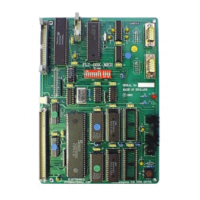9
The 68000's Instruction Set
Attributes: Size = byte, word, longword
Description: Arithmetically shift the bits of the operand in the specified direc-
tion (i.e., left or right). The shift count may be specified in one of
three ways. The count may be a literal, the contents of a data
register, or the value 1. An immediate (i.e., literal) count permits
a shift of 1 to 8 places. If the count is in a register, the value is
modulo 64 (i.e., 0 to 63). If no count is specified, one shift is made
(i.e., ASL <ea> shifts the contents of the word at the effective
address one place left).
The effect of an arithmetic shift left is to shift a zero into the
least-significant bit position and to shift the most-significant bit
out into both the X- and the C-bits of the CCR. The overflow bit
of the CCR is set if a sign change occurs during shifting (i.e., if
the most-significant bit changes value during shifting).
The effect of an arithmetic shift right is to shift the least-
significant bit into both the X- and C-bits of the CCR. The most-
significant bit (i.e., the sign bit) is replicated to preserve the sign of
the number.
Application: ASL multiplies a twos complement number by 2. ASL is almost
identical to the corresponding logical shift, LSR. The only differ-
ence between ASL and LSL is that ASL sets the V-bit of the CCR if
overflow occurs, while LSL clears the V-bit to zero. An ASR divides
a twos complement number by 2. When applied to the contents
of a memory location, all 68000 shift operations operate on a word.
Condition codes: X N Z V C
* * * * *
The X-bit and the C-bit are set according to the last bit shifted out
of the operand. If the shift count is zero, the C-bit is cleared. The
V-bit is set if the most-significant bit is changed at any time
during the shift operation and cleared otherwise.

